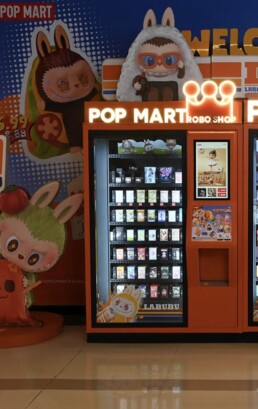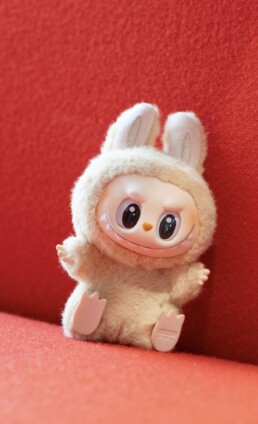Labubu: From Small Shop to Billion-Dollar Brand
🇩🇰 Du finder den danske version af denne artikel her.
You’ve probably seen them on TikTok or in queues abroad: small plush toys with sharp teeth, big eyes, and expressions that are both cute and slightly creepy. They’re called Labubu – and they’ve become the latest global collector craze.
Before you start rolling your eyes at the hype, China, or whatever else, know that there’s actually a pretty fascinating entrepreneurial story behind the phenomenon.
Valued at over $40 billion

Pop Mart vending machines line the streets of China, turning Labubu into an instant collector’s craze.
Scarcity and gamification are key elements of the strategy behind the plush toy frenzy.
Sold DVDs and small gadgets to fellow students
Pop Mart, the company behind Labubu, started as a small toy shop in Beijing in 2010. The idea was simple: to sell designer figures in limited editions to a growing audience of young collectors.
In 2019, Pop Mart launched the first Labubu plush – and things quickly took off. So much so that the company’s founder, Wang Ning, is now counted among China’s wealthiest, with a fortune of several billion dollars.
Born in 1987 in Henan province, Wang Ning studied advertising at Sias University and graduated in 2009. During his student years, he experimented with selling DVDs and small gadgets to fellow students – an early lesson in understanding what young consumers want. After a brief stint at the tech company Sina, he was inspired by Hong Kong concept stores and founded Pop Mart the following year in Beijing.
The company is listed on the Hong Kong Stock Exchange and valued at over $40 billion. In the summer of 2025, Pop Mart announced that its half-year results were expected to be more than three and a half times higher than the previous year, while its stock price surged nearly 600 percent.
All thanks to the so-called Labubu.
Online succes med fysiske automater overalt
A Labubu originally costs no more than around $15–20. But because demand far exceeds supply, they are resold at crazy prices. In Denmark, for example, you can easily find cases where plush toys that cost about $15 in China are resold for much, much more – if you can even get your hands on one.
The scarcity is far from accidental. Pop Mart has made controlling availability a strategy. Instead of mass-producing, they hold back – creating the same kind of frenzy we see with sneaker drops or Apple launches.
But the Labubu craze isn’t just about scarcity. Pop Mart is a digitally native brand that has mastered social media and gamification.
Today, thousands of Pop Mart vending machines line the streets of China, letting people buy figures like a lottery. At the same time, an app lets fans “unbox” their plush digitally before it is delivered.
It’s no coincidence that TikTok is flooded with videos of young people tearing open the plastic bag, screaming with delight – or disappointment – depending on which Labubu they get.
So what now?
Is the Labubu plush a lasting icon, destined to stand alongside Pokémon, Funko Pops, and LEGO – or just another short-lived hype we’ll soon forget?
As my own daughter dryly observed: “The hype’s probably over soon, Dad.”
Maybe she’s right. Maybe not.

WEEKLY BRIEF
Culture, business & inspiration — straight from Copenhagen to your inbox. Join over 55,500 subscribers! We send out updates once a week.


